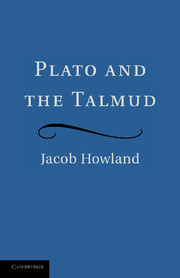Book contents
- Frontmatter
- Contents
- Acknowledgments
- Introduction: Athens and Jerusalem
- 1 Talmudic and Platonic Writing
- 2 Rabbis and Holy Men
- 3 Prophets and Philosophers
- 4 Fathers and Sons
- 5 Words and Deeds
- 6 Gods and Men
- 7 Miracles and Necessity
- Epilogue: Texts and Traditions
- Works Cited
- Index to Biblical and Rabbinic Texts
- General Index
Introduction: Athens and Jerusalem
Published online by Cambridge University Press: 10 November 2010
- Frontmatter
- Contents
- Acknowledgments
- Introduction: Athens and Jerusalem
- 1 Talmudic and Platonic Writing
- 2 Rabbis and Holy Men
- 3 Prophets and Philosophers
- 4 Fathers and Sons
- 5 Words and Deeds
- 6 Gods and Men
- 7 Miracles and Necessity
- Epilogue: Texts and Traditions
- Works Cited
- Index to Biblical and Rabbinic Texts
- General Index
Summary
What has Plato to do with the Talmud? The question is more than fair. The Platonic dialogues and the Talmud are separated in time by a millennium, and in spirit by the immeasurable gulf between the orienting concepts of the world that is by nature and the Word that is revealed by God. Plato's dialogues are philosophical dramas centered on the speeches and deeds of Socrates, while the Talmud comprises a detailed yet economically constructed law code (the Mishnah) coupled with an expansive and remarkably free-wheeling commentary (the Gemara). Socratic philosophizing consists in the critical examination of human opinions before the bar of reason; Talmudic inquiry measures itself by the comprehensive revelation of God in the Torah. In origin, orientation, style, and substance, Platonic and Talmudic writing would seem to be worlds apart. Must not the fruits with which these texts reward their readers be equally disparate?
One might reply that Athens and Jerusalem are united by a shared devotion to the acquisition of wisdom. But because this devotion springs from fundamentally different experiences, Judaism and Greek philosophy embrace distinct conceptions of what wisdom is and how it can be achieved. In the view of Leo Strauss, these conceptions are radically incompatible. “According to the Bible,” Strauss observes, “the beginning of wisdom [ḥakhmah] is fear of the Lord; according to the Greek philosophers, the beginning of wisdom [sophia] is wonder.
- Type
- Chapter
- Information
- Plato and the Talmud , pp. 1 - 25Publisher: Cambridge University PressPrint publication year: 2010



